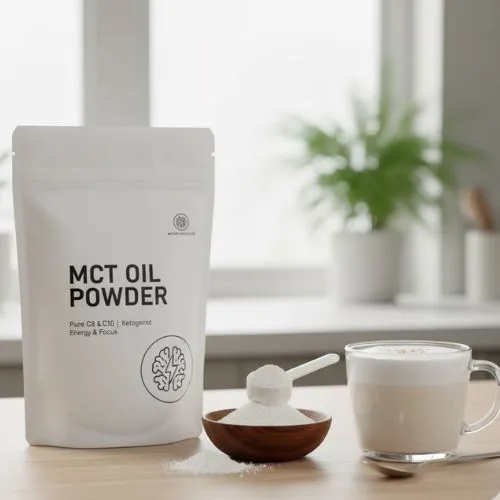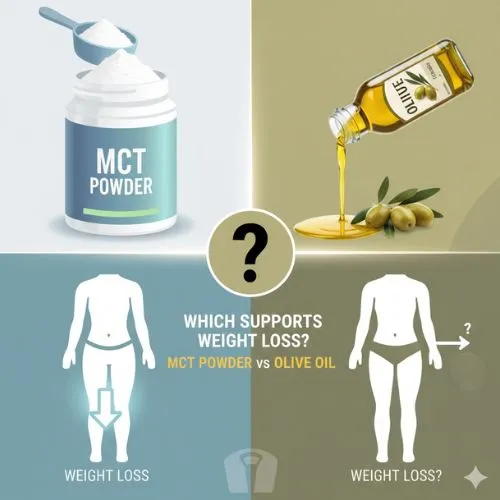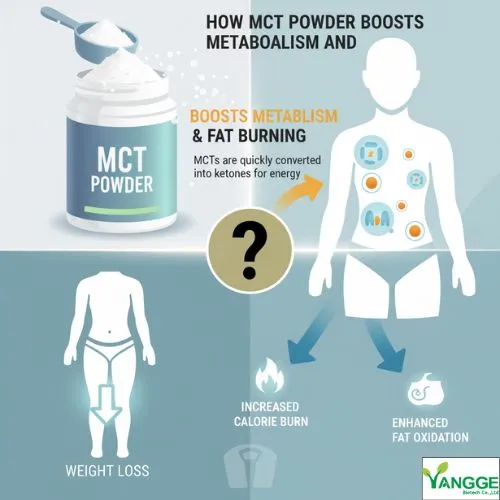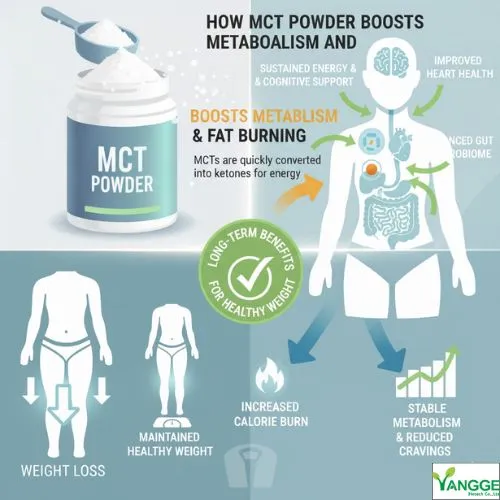MCT oil vs. olive oil for long-term weight management
When it comes to managing weight over the long term, choosing the right fats in your diet can make a significant difference. Two popular options that often come up in discussions about healthy fats are MCT oil and olive oil. While both have their merits, understanding their unique properties and effects on weight management can help you make an informed decision about which one might be better suited for your goals. In this article, we'll delve into the differences between MCT oil (particularly in powder form) and olive oil, exploring their impacts on weight loss, metabolism, and long-term health benefits.

MCT Powder vs Olive Oil: Which Supports Weight Loss?
Understanding MCT Powder
MCT powder is a concentrated form of medium-chain triglycerides (MCTs) derived from coconut oil. It's a versatile supplement that has gained popularity among those seeking to manage their weight effectively. MCT powder is created through a process called spray drying, where liquid MCT oil is combined with a carrier powder (often acacia fiber) to create a convenient, easy-to-use powder form.
The key advantages of MCT powder include its ease of use, improved digestibility, and potential for supporting weight loss. Unlike liquid MCT oil, the powder form is less likely to cause digestive discomfort and can be easily incorporated into a variety of foods and beverages.
Olive Oil: A Staple of the Mediterranean Diet
Olive oil, particularly extra virgin olive oil, has long been celebrated for its health benefits. It's a cornerstone of the Mediterranean diet, which is associated with numerous health benefits, including weight management. Olive oil is rich in monounsaturated fats, particularly oleic acid, which has been linked to various health benefits.
While olive oil is undoubtedly a healthy fat, its effects on weight loss may be more indirect compared to MCT powder. Olive oil can contribute to satiety and may help reduce overall calorie intake when used as a replacement for less healthy fats.
Comparing Weight Loss Effects
When it comes to direct weight loss effects, MCT powder may have an edge over olive oil. Studies have shown that MCTs can increase energy expenditure and fat oxidation, potentially leading to greater weight loss. A study published in the American Journal of Clinical Nutrition found that replacing long-chain triglycerides with MCTs in a weight-loss diet led to greater weight and fat mass loss.
Olive oil, while beneficial for overall health, doesn't have the same direct impact on metabolism and fat burning as MCTs. However, its role in promoting satiety and supporting a healthy diet pattern shouldn't be underestimated in long-term weight management.

How MCT Powder Boosts Metabolism and Fat Burning?
Rapid Absorption and Utilization
One of the key advantages of MCT powder over other fats, including olive oil, is its rapid absorption and utilization by the body. MCTs are transported directly to the liver, where they're quickly metabolized for energy. This unique property allows MCTs to bypass the usual fat digestion and absorption process, leading to several metabolic benefits.
The quick absorption of MCTs means they're less likely to be stored as fat compared to long-chain triglycerides found in most other dietary fats. Instead, they're more likely to be used for immediate energy, potentially supporting increased physical activity and overall energy expenditure.
Thermogenic Effect
MCT powder has been shown to have a thermogenic effect, meaning it can increase the body's heat production and energy expenditure. This effect is not observed with olive oil or other long-chain fatty acids. A study published in the European Journal of Clinical Nutrition found that MCT consumption increased energy expenditure by an average of 5% over 24 hours compared to long-chain triglycerides.
The thermogenic effect of MCTs can contribute to a higher metabolic rate, potentially supporting weight loss efforts when combined with a balanced diet and regular exercise.
Ketone Production and Fat Burning
Another unique aspect of MCT powder is its ability to promote ketone production, even in the absence of a strict ketogenic diet. Ketones are an alternative fuel source that the body can use when carbohydrate intake is low. By increasing ketone production, MCT powder may help shift the body's metabolism towards greater fat burning.
This ketogenic effect is not seen with olive oil, which does not directly promote ketone production. While olive oil can be part of a ketogenic diet, it doesn't have the same direct impact on ketone levels as MCT powder.

Long-Term Benefits of MCT Powder for Healthy Weight
Sustained Energy and Appetite Control
One of the long-term benefits of incorporating MCT powder into your diet is its potential to provide sustained energy and improve appetite control. Unlike quick-burning carbohydrates that can lead to energy crashes, MCTs provide a steady source of energy that can help maintain stable blood sugar levels and reduce cravings.
This sustained energy effect can be particularly beneficial for those trying to manage their weight over the long term. By reducing the likelihood of energy dips and associated cravings, MCT powder may help individuals stick to their dietary goals more consistently.
Improved Body Composition
Regular use of MCT powder, as part of a balanced diet and exercise routine, may contribute to improved body composition over time. Studies have suggested that MCT consumption can lead to greater reductions in body fat, particularly in the abdominal area, compared to other dietary fats.
A study published in the Journal of Nutrition found that over 16 weeks, overweight men who consumed MCTs lost more body fat and had greater reductions in waist circumference compared to those consuming long-chain triglycerides. This suggests that MCT powder could be a valuable tool for not just weight loss, but for improving overall body composition in the long term.
Metabolic Health Support
Beyond its effects on weight and body composition, MCT powder may offer long-term benefits for metabolic health. Some research suggests that MCTs can improve insulin sensitivity and glucose metabolism, which are crucial factors in maintaining a healthy weight and preventing metabolic disorders.
While olive oil also offers metabolic health benefits, the unique properties of MCTs make MCT powder a potentially more potent option for those specifically focusing on weight management and metabolic health.

Conclusion
In the comparison between MCT oil and olive oil for long-term weight management, both offer unique benefits. MCT powder, with its rapid absorption, thermogenic effects, and potential to boost ketone production, may have a more direct impact on weight loss and metabolism. Its ability to provide sustained energy, improve body composition, and support metabolic health makes it a valuable tool for those focused on long-term weight management. While olive oil remains an important part of a healthy diet, MCT powder offers specific advantages for those looking to optimize their weight loss efforts and maintain a healthy weight over time.
At Yangge Biotech Co., Ltd., we understand the importance of high-quality ingredients in achieving your health and wellness goals. Our MCT powder, derived from coconut oil and manufactured to the highest standards, is designed to support your long-term weight management journey. Whether you're looking to boost your metabolism, improve body composition, or simply maintain a healthy weight, our MCT powder can be a valuable addition to your dietary regimen. At Yangge Biotech Co., Ltd., we're committed to providing innovative, high-quality solutions for the health and wellness industry. Our MCT powder, derived from coconut oil and manufactured using advanced HPLC extraction methods, represents the pinnacle of MCT supplementation. Whether you're a food manufacturer, supplement producer, or health-conscious consumer, our MCT powder can help you achieve your goals. With its superior solubility, great taste, and wide range of applications, our MCT powder is the ideal choice for those seeking the benefits of MCTs in a convenient form. Contact us at info@yanggebiotech.com to learn more about our premium MCT powder and how it can enhance your products or support your health journey.
FAQ
Q: Can we get some samples to test before purchasing?
A: Of course, we can provide free samples of 20 to 100 grams, but the shipping cost is at the customer's expense. The shipping cost can be deducted from the next order, or the samples can be sent through your courier account.
Q: Do your products have relevant certifications?
A: Yes, our products are certified for HALAL, ISO, HACCP, Kosher, and other certifications.
Q: What is the minimum order quantity (MOQ)?
A: Small batches of samples can be customized according to your requirements.
Q: Do you offer OEM and ODM services? Can the formula be customized based on our own?
A: Of course, we provide ODM and OEM services to many customers. Our product range includes softgels, capsules, tablets, sachets, granules, and private label services. Simply contact us and let us know your requirements. Our experienced R&D team can also develop new products with specific formulas.
Please contact us to design your own branded products.
Q: How do you handle quality complaints?
A: First, we have a comprehensive quality control SOP. We provide authoritative third-party inspection reports for almost all products before shipment to minimize the possibility of quality issues. Second, we have a comprehensive return and exchange procedure. If there is a genuine quality dispute, we will strictly follow the SOP.
Q: How do you ship? How long does delivery take?
A: For small orders, we typically use DHL, UPS, EMS, FedEx, or TNT. Delivery typically takes 3-7 days. We also offer air and sea freight services. We have a strong freight forwarding team and can provide you with a one-stop service, including DDP and DDU.
Q: What are your payment terms?
A: 100% prepayment, payable by T/T, Western Union, MoneyGram, or PayPal.
Q: What is the shelf life of your products?
A: 2 years with proper storage.
Q: Is the packaging environmentally friendly?
A: We attach great importance to environmental protection and are constantly improving our product packaging. Some products are packaged in recyclable paper. Packaging materials are carefully selected to ensure product safety during transportation and storage, and to minimize environmental impact. We are committed to achieving a balance between environmental friendliness and practicality in our product packaging, and to contributing to sustainable development.
References
1. St-Onge, M. P., & Bosarge, A. (2008). Weight-loss diet that includes consumption of medium-chain triacylglycerol oil leads to a greater rate of weight and fat mass loss than does olive oil. American Journal of Clinical Nutrition, 87(3), 621-626.
2. Mumme, K., & Stonehouse, W. (2015). Effects of medium-chain triglycerides on weight loss and body composition: a meta-analysis of randomized controlled trials. Journal of the Academy of Nutrition and Dietetics, 115(2), 249-263.
3. Clegg, M. E. (2010). Medium-chain triglycerides are advantageous in promoting weight loss although not beneficial to exercise performance. International Journal of Food Sciences and Nutrition, 61(7), 653-679.
4. Rial, S. A., Karelis, A. D., Bergeron, K. F., & Mounier, C. (2016). Gut Microbiota and Metabolic Health: The Potential Beneficial Effects of a Medium Chain Triglyceride Diet in Obese Individuals. Nutrients, 8(5), 281.
5. Nosaka, N., Suzuki, Y., Nagatoishi, A., Kasai, M., Wu, J., & Taguchi, M. (2009). Effect of ingestion of medium-chain triacylglycerols on moderate- and high-intensity exercise in recreational athletes. Journal of Nutritional Science and Vitaminology, 55(2), 120-125.

Based on your location and order quantity, you will have the opportunity to receive a limited time free shipping promotion!

Who we are


